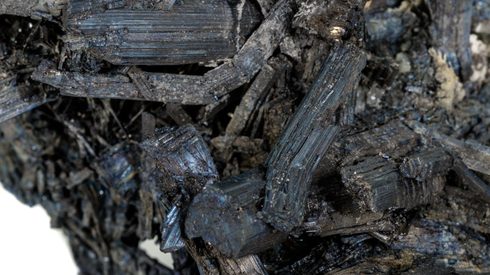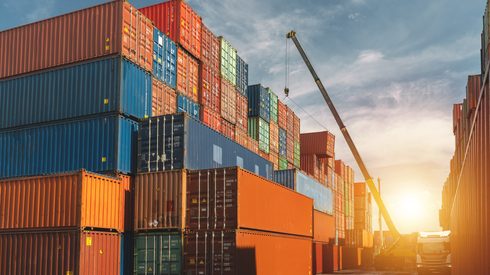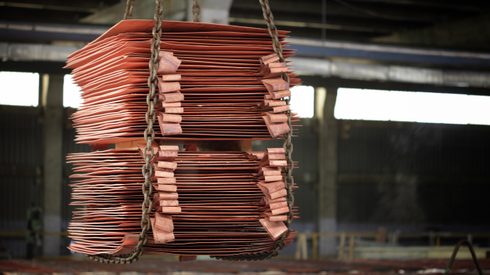As a diversion from the real demands of LME Week, Metal Bulletin presents a fictional metals trading tale by Geoffrey Sambrook. Chapters III-VII follow next week.
I
Matthias Horner closed his front door gently behind him and scrunched across the gravel drive to the garage. He flicked the button on his car key ring, and the garage door began to swing open, as did the gate at the end of the drive a hundred metres away. He opened the door of the silver Tesla Model S and settled into the seat. Sure, for the short drive from his home in the exclusive suburb of Geneva to the Metal-Exx head office in the centre of town hardly warranted a five hundred horsepower car, but what the hell – he was Metal-Exx’s top copper trader, and if he couldn’t indulge himself, who could? Behind the closed shutters of the house, his wife and children slept on. They didn’t need to be on the road at five thirty in the morning.
As he accelerated out of the drive and onto the road, he punched the radio button. Soft rock. He glanced at the dashboard clock: 5:28. He was slightly ahead of schedule. There was no traffic so early, and as he pulled out onto the highway he put his foot down and the car surged forward. He loved the smooth power delivery of the electric motors, giving him the acceleration of a supercar. The pips sounded from the speakers.
“Good Morning. It’s five thirty on Tuesday the twentieth of November 2015. Here are the news headlines. The gyrations in the world’s stock markets continue. Although yesterday evening the Dow Jones recovered some of its recent losses to finish up one and a half percent, the Shanghai market has shed a further four percent today. That takes the index to a new three-year low and has had knock-on effects on the markets in Tokyo, Taipei and Seoul. More falls are expected when European markets open this morning. The price of oil has also fallen further this morning, meaning that petrol at the pumps will continue its downward move.”
Horner snorted to himself at the blatant attempt of the radio station to put a positive gloss on the news. Yes, of course petrol prices here in Europe would drop. But prices dropping because nobody wanted the stuff was hardly something to get enthusiastic about. As the newsreader carried on with his story, Horner hit another button on the iPad-like central screen on the dashboard to bring up his phone contacts. He needed to have a word with his man in Shanghai. Before he could make the call, though, his phone rang. “Steiner” was the name flashing on the screen in sync with the ringing.
Horner hesitated for a moment. Jakob Steiner was the finance chief at Metal-Exx – the second most important man in the company after CEO Phillipe Millault. Steiner controlled payments in and out of the company – and although by now it had grown to a publicly-quoted, multi-billion-dollar behemoth, he was still as meticulous in tracking everything as when he and Millault had helped set it up all those years ago. A call from Steiner at five thirty in the morning rarely presaged good news. Still, he couldn’t ignore it.
“Jakob, good morning,” he said.
“Yeah, I think we may have a problem developing. How much are we owed back in balancing payments against provisional amounts on the DRC copper we’ve shipped to Chinese smelters?”
“Well, that depends on the copper price,” Horner began.
“Yes, I know how it works, Matthias. I’m not asking to the last dollar. Copper has dropped like a stone in the last three months. We’ve made provisional payments to Congo Copper on the basis of the old price. How much – to the odd million or so – do they now have to pay back against final pricing?”
“Well, I’d have to check. It won’t be a particularly big number, though. We have been buying pretty much everything from them – and a lot of the others – with three- and four-month after-shipment QPs. That’s how we ran this year’s sales campaign, if you remember. But even so, even with the big drop in copper, it’s not going to be a huge amount they will owe us back.”
“Yes, I know. I’m just trying to get my mind round the cash flow implications right now. Have a look when you get in and come and see me at eight.” The phone clicked off.
The radio, muted during the phone call, faded back in. The turmoil in international markets was still the topic.
“Resource shares have been the worst hit again overnight, spooked by figures coming out showing substantial falls in the volumes of iron ore and oil imported by China in the last quarter. BHP Billiton and Rio – both major iron ore producers – have seen their share price hit ahead of the London opening by around a further three percent, on top of recent falls. Worst affected today, though, has been the commodity trading company Metal-Exx, headquartered in Geneva but with its shares quoted in Hong Kong as well as London. The Hong Kong quote was down five percent in today’s trading alone, on worries about the extent of its exposure to weakening Chinese metal markets. We will have more on this story in an hour.
“In other news, migrants in Hungary are becoming increasingly violent as they attempt…”
Horner switched the radio off. It wasn’t a pretty picture. On the other hand, though, the attacks on Metal-Exx were exaggerated. As one of the inner circle of top management, he knew the company was sound. Business levels were down – particularly from China – but he and his fellow traders held their jobs down specifically because they were skilled in riding the peaks and troughs of the commodity markets.
That was what they did, as they had convinced the investing public when they had floated the company back in 2007. They’d navigated the financial crash that engulfed the world then and there was no reason to suspect that they couldn’t do the same again, even in this burgeoning China crisis. In fact, if the price kept dropping, perhaps it would be time to add to his already substantial shareholding in the company. Like many of his colleagues, he had sold all he was allowed to on flotation and had been slowly buying them back as the price had dropped in the intervening years. Nothing wrong with that; that was just trading. Millault and his colleagues had judged the right moment for the original sale.
Steiner was already behind his desk in the top floor office he shared with Millault. The two of them had worked together for years, climbing through the Phillip Brothers and Marc Rich hierarchies until they had struck out on their own and joined Roger Ertl in establishing Metal-Exx. Now, since Ertl had retired a couple of years ago, they were at the top of the pile; others – like Glencore or Trafigura – might be bigger in absolute terms, but they were multi-commodity outfits. Metal-Exx had stuck to its origins in metals, and it was the undisputed king of that market. Since the flotation, with greater access to capital markets, the business had boomed and the supply of African copper from the ex-State mines now owned by Congo Copper (run by DeWet Steyn, a London-based South African) to the concentrate-hungry smelters of China had been the public face of that success.
But Steiner knew there was more behind public appearances, and that the company had a problem. It dated back to the global crisis in 2008, headlined by the bankruptcy of Lehmann Brothers. With the collapse in asset values and the strangling of credit, global trade levels had fallen off a cliff. The natural reaction of mining companies – and indeed the policy they had pretty much always followed in previous crises – would have been to cut back their production in the face of declining demand in order to give some support to prices and their own positions. But flush with the cash raised by their own flotation a year or so earlier, Millault, Steiner and the rest of their senior executives had hit on a much better scheme. Western governments, desperate to stimulate flagging economies, pumped money into the banking system in an attempt to get lending moving. But the clever traders of Metal-Exx were one step ahead, and proposed to the banks – recipients of that cheap governmental money – a seemingly far more secure business than lending to uncertain industrial enterprises. They could see that the majority of base metals were in a contango – where forward prices were higher than spot ones – and frankly likely to stay that way for the foreseeable future.
So Metal-Exx went hammering on the doors of all the miners and smelters they knew, with a proposition. Instead of cutting production, sell it all to Metal-Exx, who, armed with their cash and borrowing power, would then sell it forward on the futures market and pocket the difference between spot and forward price – minus costs associated with storage – as their secure profit.
It worked a treat. Of course, once the rest of the world saw what was going on, there was a rush of competition, but Metal-Exx, through being there first and, with their strong credit rating able to offer the best deals, kept ahead of the pack. The net result was that by the autumn of 2015, the world was awash with metal that wasn’t required for consumption. Mines and smelters whose output in more normal circumstances would have been curtailed were still running at close to full capacity and the world’s warehousing sheds were full to bursting point. Everybody, more or less, was happy, particularly those who owned warehouses. Being a warehouseman was rather like winning a lottery.
II
What Steiner was looking at, though, suggested Metal-Exx was actually a victim of its own success. The metal financing trade was great – a secure income stream, and control over large parts of the world’s stock of metals, with the obvious benefit that would bring when demand surged back again. The downside was the amount of money they had tied up. Not only their own capital, but borrowings as well. In fact, all the money that they had been able to raise. He’d been responsible for making the cash available to feed the traders’ desires to grow their businesses, and now he was beginning to have a feeling that perhaps they had pushed things too far. It was absurd that a company the size of Metal-Exx should be concerned about the timing of provisional and final payments to their mining suppliers, but the numbers he was looking at on the sheets on his desk were forcing him to exactly that conclusion. It was all caused by the precipitate drop in the copper price.
As part of the normal course of its copper concentrate business, Metal-Exx shipped consignments of material from a variety of mines – in Africa, South America, Asia – to its smelter customers, who in recent years had been mainly in China as the Chinese share of the copper business had surged. The whole process of mining, concentrating, moving, shipping across the ocean and eventually smelting and refining the ore into a product suitable for manufacturing into end-products was a time-consuming one, and nobody in the value chain wanted to be out of pocket while the material was flowing through the process. Part of the function of Metal-Exx, as the trader in the middle, was to use its finance and the facilities of the London Metal Exchange to enable the transactions to go through; for a fee, of their profit, of course. One of the ways of doing this was to split the movement of the money from the time of the pricing of the material.
Thus, in the contracts on Steiner’s desk, Metal-Exx had contracted to agree the price with the mining companies three or four months after the material had been shipped on its ocean voyage. To keep the mine solvent, the trader had agreed to pay sometimes eighty, sometimes ninety, percent of the price pertaining at the time of shipment as a provisional amount when the concentrate was loaded onto the ship. Then, when the final price was agreed – three or four months later – there would be a balancing payment, in one direction or the other, to finalise the trade. Metal-Exx had no actual exposure to price changes during that period, since it was able to hedge that on the LME.
However, when there was a violent, rapid drop in the price, Metal-Exx could be left in a position where the mining company owed them money back, because the final price made the material worth less than the provisional payment. To outsiders, that might sound convoluted, but to Steiner it was a pretty straightforward piece of business, given the existence of the futures exchange, designed to oil the wheels of the trade.
What was bothering Steiner, though, was the amount of money Metal-Exx was currently due back after copper’s substantial, continued drop in price. He had no concerns about being owed money by the majors – Codelco, BHP, Freeport and the like – they would pay on time, with no problems. He was, however, disturbed by the figure he saw against the name of Congo Copper.
The relationship between DeWet Steyn and Metal-Exx was a long and complex one. A South African mining engineer in origin, Steyn had been around Central Africa for years, promoting a raft of different junior mining companies producing cobalt, coltan, diamonds and pretty much anything else from that mineral-rich belt. Metal-Exx had always been prepared to take product from him, sometimes closing an eye to the actual details of the provenance. Then, a few years ago, he’d lucked out and got the opportunity to put together a bid for substantial copper operations in the DRC. Metal-Exx had supported him, not by buying into the consortium, but by giving a guarantee to take his production, thus making his bid a bankable proposition. That had catapulted Steyn into the big league.
But Congo Copper didn’t really sit on the right part of the cost curve, though, which was why Metal-Exx had preferred to be an off-taker rather than a shareholder. Steiner knew that after the drop in the copper price, it was unlikely that the operations were profitable. That’s why he didn’t want to be in a position of being owed money by the miner.
From the sheets in front of him, he could see two ugly truths. First, Congo Copper had indeed missed a couple of payments – not huge amounts, but disturbing with bigger ones coming due in the near future. Secondly, and he kept going back over this because it was hard to believe, Metal-Exx looked like it was facing a serious hole in its projected cash flows. It was absurd; they were the biggest and most profitable metal trader in the game. The contracts Steiner had among the papers in front of him were all positive trades; and yet, unless he could raise some more cash from somewhere, that mighty company was going to miss making payments it owed.
Phillipe Millault was away travelling that day, which gave Steiner a dilemma. On the one hand, he would have to know about the problem, but on the other, Steiner would rather resolve it and then present the problem and its solution together. Horner was already coming in to see him at eight; he called an internal number.
“Hello? Eisenstadt.”
“Max, hi. It’s Jakob. Could you come along to my office at eight. There’s something I need to discuss with you and Matthias.”
“Sure, I’ll be there.”
Max Eisenstadt was Metal-Exx’s veteran aluminium trader and de facto senior trader by virtue of his years of experience – and his age; he stood out among his colleagues as the representative of a previous generation. None of them dared question his effectiveness, though. The aluminium book, year after year, was the single biggest element in Metal-Exx’s annual profit. Eisenstadt himself had made a fortune, and his success and age gave him a position as a kind of father confessor to some of his colleagues. Steiner knew he could rely on the older man to grasp the full picture of where they stood that morning. He rubbed his eyes. It was still only six forty-five. He stood up and wal
ed across to the window, looking out across the lake, lights twinkling in the approaching dawn.
He never tired of the view; he was Austrian, but after initially founding the company in Vienna, he, Millault and Ertl had shifted it to Geneva about fifteen years or so ago. It was only partly for tax reasons. It was easier to persuade traders to come and live in Geneva – where they had a like-minded international community to socialise with – and Geneva was a better global hub. The fact that Millault himself was Swiss had also played its part. Steiner was rich, happy and settled with Metal-Exx. The company had consumed a lot of his life, and he wasn’t going to let it go. They’d find a way through the problem. They always had in the past. In the pool of light in front of the window, he saw flakes of snow beginning to fall. Despite his sixty-odd years, Steiner was still a keen skier. He took this first fall of the year as a good omen.
Chapters III-VII follow daily, next week
Geoffrey Sambrook
editorial@metalbulletin.com






